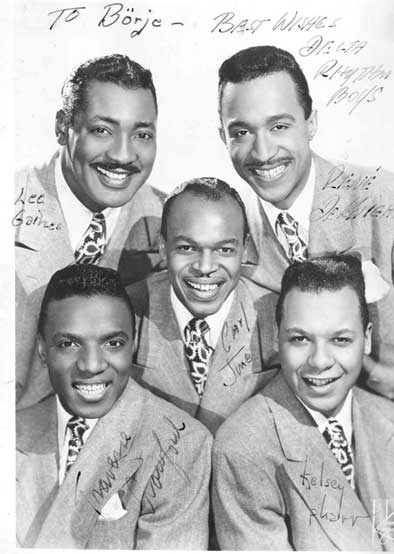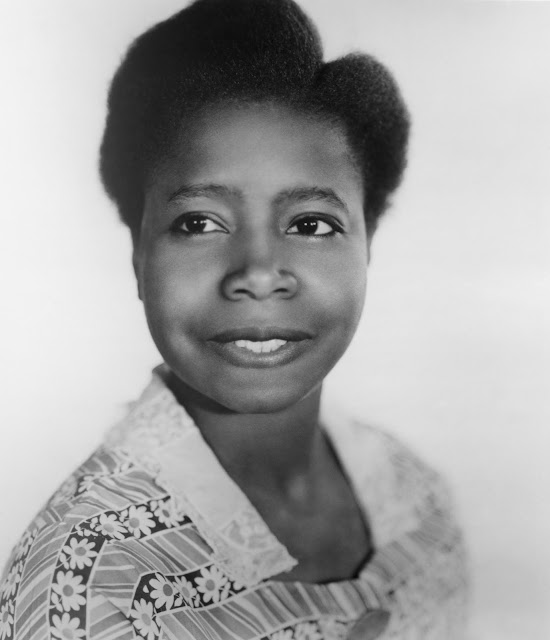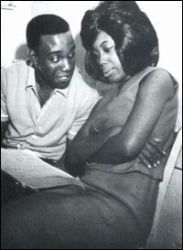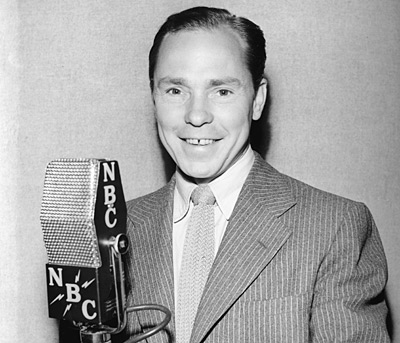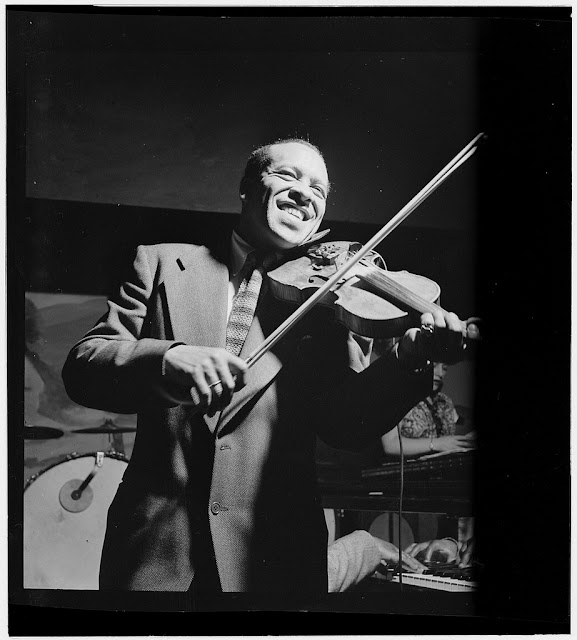http://global-pillage.blogspot.com
'Nuff sed.....certainly worth a visit...excellent stuff :)
Search This Blog
Friday, September 30, 2011
In advance of a Rose "Chi Chi" Murphy request list from Patrick (Ravel), in Montreal ...Two AFRS Jubillee OTR's :)
A nice one today.......An AFRS Jubillee from January 29, 1945. Program #118. With The Charlie Barnet Orch., Peanuts Holland on trumpet and vocals, Rose "Chi Chi" Murphy, Sam McDaniel, The Eddie Heywood Combo, Ernest Whitman as M.C., and Verne Smith as announcer.
Enjoy!
Charlie
Rose
Peanuts
Eddie
BUT WAIT!! Here's one more!! Another AFRS Jubilee --this one from July 12, 1943. Program #33. Rose Murphy, The Delta Rhythm Boys, Dolores Williams, Jimmie Lunceford and His Orchestra, Earl Carruthers (vocal), Ada Brown, Butterfly McQueen, and Ernest Whitman as M.C.
Dolores Williams
Jimmie Lunceford
Ada
Butterfly
Labels:
OTR,
radio,
various artists
Monday, September 26, 2011
Buster Bailey Part 2...as leader and sideman.........
Ahhhh......here's a few more
Cutie blues-Erskine Tate's Vendome Orchestra
Kansas City Kitty-Noble Sissle
Lorna Doone Short Bread-Spencer Trio
Man With A Horn Goes Berserk-
More Than That-
Night Whispers-
Papa De Da Da-
Pine Top's Boogie Woogie-
Planter's Punch-
Rhythm, Rhythm-Lionel Hampton & His Orch.
Royal Garden Blues-John Kirby & His Orch.
Santa Claus Blues-Red Onion Jazz Babies
Seems Like A Month Of Sundays (Since I Saw You Saturday Night)-
Sensation rag-Fletcher Henderson & His Orch.
Shanghai Shuffle-
Should I (from Lord Byron of Broadway)-
Sloe Jam Fizz-
So You Won't Sing-
Squeeze Me-
St. Louis Blues-John Kirby & His Orch.
Static Strut-Erskine Tate's Vendome Orchestra
Stomp Off Let s Go-Erskine Tate's Vendome Orchestra
Theres A House In Harlem For Sale-Henri Allen & His Orch.
Warmin Up-Teddy Wilson & His Orch.
Wild Party-Fletcher Henderson & His Orch.
http://www.megaupload.com/?d=JKYEC9YW
Labels:
buster bailey,
various artists
Wednesday, September 21, 2011
Betty Everett Part 2............
Here comes Part 2...........
In Your Arms-
Is There A Chance For Me-
It Hurts To Be In Love-
It's all right-(Featuring Jerry Butler)
It's Been A Long Time-
June Night-
Just A Little Piece Of You-
Just A Man's Way-
Just Be True (Featuring Jerry Butler)-
Killer Diller-
Let It Be Me (Featuring Jerry Butler)-
Love Comes Tumbling Down-
Love Is Strange (Featuring Jerry Butler)-
Maybe-
My Life Depends On You-
My Love-
No Place To Hide-
Nothing I Wouldnt Do-
Our day will come-(Featuring Jerry Butler)
Please Love Me-
Since i don't have you-(Featuring Jerry Butler)
Smile (Featuring Jerry Butler)-
Sugar-
Sweet Dan-
The Prince Of Players-
The Real Thing-
The Same Old Me-
The Shoe Won't Fit-
The Shoop Shoop Song (It's In His Kiss) (Backing Vocals by The Opals)-
http://www.megaupload.com/?d=1R7Q1OV3
In Your Arms-
Is There A Chance For Me-
It Hurts To Be In Love-
It's all right-(Featuring Jerry Butler)
It's Been A Long Time-
June Night-
Just A Little Piece Of You-
Just A Man's Way-
Just Be True (Featuring Jerry Butler)-
Killer Diller-
Let It Be Me (Featuring Jerry Butler)-
Love Comes Tumbling Down-
Love Is Strange (Featuring Jerry Butler)-
Maybe-
My Life Depends On You-
My Love-
No Place To Hide-
Nothing I Wouldnt Do-
Our day will come-(Featuring Jerry Butler)
Please Love Me-
Since i don't have you-(Featuring Jerry Butler)
Smile (Featuring Jerry Butler)-
Sugar-
Sweet Dan-
The Prince Of Players-
The Real Thing-
The Same Old Me-
The Shoe Won't Fit-
The Shoop Shoop Song (It's In His Kiss) (Backing Vocals by The Opals)-
http://www.megaupload.com/?d=1R7Q1OV3
Labels:
betty everett
The continuing BIG Django Reinhardt list......the "L"s.....
Here's more..............The "L"s............. ;)
L'Amour en Fleurs-AIMÉ SIMON-GIRARD (ORCH. MICHEL WARLOP) 1934
L'Amour en voyage-JEAN TRANCHANT, ACCOMPAGNÉ PAR MICHEL EMER ET SON ORCHESTRE 1936
L'Ondée- ORCH. MUSETTE JEAN VAISSADE 1928
La Caravane- ORCH. MUSETTE JEAN VAISSADE 1928
La Chanson du large- GERMAINE SABLON & L’ORCH. MICHEL WARLOP 1934
La Cigale Et La Fourmi-CHARLES TRÉNET & LE QUINTETTE DU H.C.F. 1941
La Derniere Bergere- JEAN SABLON 1935
La Jambe en bois-JEAN SABLON ET SES AMIS 1936
La Mer (Beyond The Sea)-ROME SESSIONS 1949
La pergola.-L’ACCORDEONISTE ALEXANDER 1928
La Petite Ile-GERMAINE & JEAN SABLON 1935
La Plus Belle- ORCH. MUSETTE JEAN VAISSADE 1928
La Rumba-da-Boum- ELIANE DE CREUS ET SES BOYS 1934
Lady Be Good (2)-TRIO DE VIOLONS 1937
Lady Be Good-1934
Lambeth Walk-QUINTETTE DU HOT CLUB DE FRANCE 1938
Lancer Leger (Peche A La Mouche)-DJANGO REINHARDT & LE QUINTETTE DU HOT CLUB DE FRANCE 1947
Le Jour où je te vis [The Day You Came Along]- JEAN SABLON & L’ORCH. ANDRE EKYAN 1934
Le même coup- JEAN SABLON 1933
Le Piano mécanique-PROGRAMME RADIOPHONIQUE DU “MICRO DE LA REDOUTE” 1936
Le Roi Marc-JEAN TRANCHANT, AVEC STEPHANE GRAPPELLY ET DJANGO REINHARDT 1936
Le Sheik-NOËL CHIBOUST ET SON ORCHESTRES 1940
Le soir-DJANGO REINHARDT (Session Decca 1953)
Lentement, Mademoiselle (2)-DJANGO REINHARDT & LE QUINTETTE DU H.C.F. 1947
Lentement, Mademoiselle-DJANGO REINHARDT & LE QUINTETTE DU H.C.F. 1942
Les Baisers prisonniers-PROGRAMME RADIOPHONIQUE DU “MICRO DE LA REDOUTE” 1936
Les Quatre Farceurs-NANE CHOLET 1935
Les Salades De l'Oncle François-JACOTTE PERRIER & LE QUINTETTE DU H.C.F. 1938
Les Yeux Noirs (Dark Eyes)-DJANGO REINHARDT & LE QUINTETTE DU HOT CLUB DE FRANCE
(Radio Sessions - 1947)
(Radio Sessions - 1947)
Les Yeux Noirs (Dark Eyes)-QUINTETTE DU HOT CLUB DE FRANCE AVEC ALIX COMBELLE 1940
Les Yeux Noirs-PIERRE ALLIER ET SON ORCHESTRE 1940
A Little Love, a Little Kiss-QUINTETTE DU HOT DE FRANCE 1937
Liebesfreud-QUINTETTE DU HOT CLUB DE FRANCE AVEC ALIX COMBELLE 1940
Liebestraum No. 3- QUINTETTE DU HOT DE FRANCE 1937
Lilly Belle May June-DJANGO REINHARDT & LE QUINTETTE DU HOT CLUB DE FRANCE 1935
Limehouse Blues (2)-DJANGO’S MUSIC 1940
Limehouse Blues (3)-QUINTETTE DU HOT CLUB DE FRANCE 1936
Limehouse Blues-STÉPHANE GRAPPELLY AND HIS HOT FOUR 1935
Liza (2)-DJANGO REINHARDT & STéPHANE GRAPPELLI 1946
Liza-ROME SESSIONS 1949
Louise (2)-DJANGO REINHARDT & LE QUINTETTE DU HOT CLUB DE FRANCE-Radio Sessions - 1947
Louise-DJANGO REINHARDT (SOLOS) ET GRAPPELLI 1938
Love's Melody (Melodie Au Crepuscule)-DJANGO REINHARDT & STéPHANE GRAPPELLI 1946
Love's Mood-DJANGO REINHARDT & LE QUINTETTE DU HOT CLUB DE FRANCE (Blue Star Sessions - 1947)
Lover (2)-DJANGO REINHARDT & L'ORCHESTRE D'HUBERT FOL AU CLUB SAINT-GERMAIN (Radio 1951)
Lover Man (2)-ROME SESSIONS 1949
Lover Man (3)-DJANGO REINHARDT & LE QUINTETTE DU HOT CLUB DE FRANCE-Radio Sessions - 1947
Lover Man-DJANGO REINHARDT & LE QUINTETTE DU HOT CLUB DE FRANCE 1947
Lover, Come Back To Me (2)-LARRY ADLER AV. LE QUINTETTE DU H.C.F. 1938
Lover, Come Back To Me-LARRY ADLER AV. LE QUINTETTE DU H.C.F. 1938
Lover-DJANGO REINHARDT AVEC AIME BARELLI & SON ORCHESTRE AU "REX" (Radio - 1952)
Loves Melody (Melodie Au Crépuscule)-DJANGO REINHARDT & LE QUINTETTE DU HOT CLUB DE FRANCE 1947
Low Cotton-REX STEWART AND HIS FEETWARMERS 1939
Labels:
django reinhardt
Tuesday, September 20, 2011
This afternoon's OTR: Jubilee..#61 AFRS Jan. 17, 1944 Cee Pee Johnson Orch Johnny Mercer Delta Rhythm Boys Timmie Rogers
Good one, today...AFRS Jubillee #61....01-17-1944. Hosted by Ernie Whitman, and featuring Cee Pee Johnson Orch, Johnny Mercer, Delta Rhythm Boys, and Timmie Rogers.
Cee Pee Johnson with Buddy Collette, and Paul Robeson
Delta Rhythm Boys
Johnny MercerTimmie Rogers
Labels:
OTR,
radio,
various artists
Part one of the classic William P. Gottlieb jazz photos
Celebrated jazz artists come to life in photographs by William P. Gottlieb. His images document the jazz scene in New York City and Washington, D.C., from 1938 to 1948, a time recognized by many as the "Golden Age of Jazz".
Gottlieb was both a notable jazz journalist and a self-taught photographer who captured the personalities of jazz musicians and told their stories with his camera and typewriter. His portraits depict such prominent musicians and personalities as Louis Armstrong, Duke Ellington, Billie Holiday, Thelonious Monk, Ella Fitzgerald, and many more.
Gottlieb was both a notable jazz journalist and a self-taught photographer who captured the personalities of jazz musicians and told their stories with his camera and typewriter. His portraits depict such prominent musicians and personalities as Louis Armstrong, Duke Ellington, Billie Holiday, Thelonious Monk, Ella Fitzgerald, and many more.
To learn more about William Gottlieb, visit the Library's Performing Arts Encyclopedia, Gottlieb Collection. By looking at Gottlieb’s negatives here, you’ll see examples of the raw camera images and also copies of his
final cropped images for insight into the creative process. At LOC, we also have special features like interviews with Gottlieb, ”In His Own Words".
final cropped images for insight into the creative process. At LOC, we also have special features like interviews with Gottlieb, ”In His Own Words".
Dig these....chances are you've seen a few of them....I'm going to start with this post of a few, and continue with as many as I can find....enjoy :)
(click on photo for larger res copy)
Art Hodes, Ole South, New York, N.Y., ca. Oct. 1946
Buck Clayton, New York, N.Y., between 1938 and 1948
Cab Calloway, New York, N.Y., ca. Oct. 1946
Carl Kress, New York, N.Y., ca. June 1947
Count Basie, Aquarium, New York, N.Y., between 1946 and 1948
Cozy Cole, Ole South, Washington, D.C., between 1938 and 1948
Doris Day and Kitty Kallen, Central Park, New York, N.Y., ca. Apr. 1947
Fats Navarro, New York, N.Y., between 1946 and 1948
Gene Krupa, 400 Restaurant, New York, N.Y., ca. June 1946
Georgie Auld, New York, N.Y., ca. Aug. 1947
John Kirby, Brown Derby, Washington, D.C., ca. May 1946
June Christy, 1947 or 1948
Lawrence Brown, Aquarium, New York, N.Y., ca. Nov. 1946
Lionel Hampton, Aquarium, New York, N.Y., ca. June 1946
Louis Armstrong, Aquarium, New York, N.Y., ca. July 1946
Maxine Sullivan, Village Vanguard, New York, N.Y., ca. Mar. 1947
Milt (Milton) Jackson and Ray Brown, New York, N.Y., between 1946 and 1948
Oscar Pettiford, Aquarium, New York, N.Y., ca. Nov. 1946
Ray McKinley, Hotel Commodore, New York, N.Y., ca. Apr. 1946
Sarah Vaughan, Café Society (Downtown), New York, N.Y., ca. Aug. 1946
Sarah Vaughan, Café Society (Downtown), New York, N.Y., ca. Aug. 1946
Stuff Smith, Kelly's Stable, New York, N.Y., ca. Sept. 1946
Tadd Dameron, New York, N.Y., between 1946 and 1948
Thelonious Monk, Minton's Playhouse, New York, N.Y., ca. Sept. 1947
Labels:
photography,
various artists
Hard rockin' Conway Twitty.....Part 1 Early Rockabilly,R 'N B, Rock and Roll 1956-1964
Conway Twitty
Conway Twitty (September 1, 1933 – June 5, 1993), born Harold Lloyd Jenkins, was an American country music artist. He also had success in early rock and roll, R&B, and pop music. He held the record for the most number one singles of any act with 55 No. 1 Billboard country hits until George Strait broke the record in 2006. From 1971–76, Twitty received a string of Country Music Association awards for duets with Loretta Lynn. A former member of the Grand Ole Opry, he was inducted into both the Country Music and the Rockabilly Halls of Fame.
Conway Twitty was born Harold Jenkins on September 1, 1933 in Friars Point, Mississippi. He was named by his great uncle, after his favorite silent movie actor, Harold Lloyd. The Jenkins family moved to Helena, Arkansas when Jenkins was 10 years of age, and it was in Helena that he put together his first singing group, the Phillips County Ramblers.
Two years later, he had his own local radio show every Saturday morning. Jenkins also practiced his second passion, baseball. He received an offer to play with the Philadelphia Phillies after high school (Smiths Station High), but he was drafted into the US Army. He served in the Far East and organized a group called The Cimmerons to entertain fellow GIs.
Accounts of how Jenkins acquired his stage name vary. As one account would have it, Jenkins felt that his real name wasn't marketable, and he changed his show business name in 1957. Looking at a road map, he spotted Conway, Arkansas and Twitty, Texas. Thus, he went with the professional name of Conway Twitty.
Alternatively, Jenkins met a Richmond, Virginia, man named W. Conway Twitty Jr. through Jenkins' manager in a New York City restaurant. The manager served in the US Army with the real Conway Twitty. Later, the manager suggested to Jenkins that he take the name as his stage name because it had a ring to it. W. Conway Twitty subsequently recorded the song, "What's in A Name But Trouble" in the mid-1960s, lamenting the loss of his name to Jenkins.
Twitty's fortunes changed in 1958, while he was with MGM Records, under the name Conrad. An Ohio radio station did not play "I'll Try", an MGM single that went nowhere in terms of sales, radio play, and jukebox play; instead playing the B side, "It's Only Make Believe", a song written between sets by Twitty and drummer Jack Nance when they were in Hamilton, Ontario playing at the Flamingo Lounge. The record took nearly one year to reach and stay at the top spot on the Billboard pop music charts in the U.S., as well as No. 1 in 21 other countries. It became the first of nine Top 40 hits for Twitty. That same year, country singer Tabby West of ABC-TV's Ozark Jubilee heard Twitty and he was booked to appear on the show.
For a brief period, some believed he was Elvis Presley recording under a different name. This was largely the case with "It's Only Make Believe". Twitty would go on to enjoy rock and roll success with songs including "Danny Boy" (pop No. 10) and "Lonely Blue Boy" (pop No. 6). "Lonely Blue Boy", originally titled "Danny", was recorded by Presley for the film King Creole but was not used in the soundtrack.
In 1960, he appeared in three feature films, College Confidential, Sex Kittens Go to College and Platinum High School.
Twitty always wanted to record country music and—beginning in 1965—he did just that. His first few country albums were met with some country DJs refusing to play them because he was known as a rock-n-roll singer. However, he finally broke free with his first top five country hit, "The Image of Me", in July 1968, ensued by his first number one country song, "Next In Line", in November 1968. Few of his singles beginning in 1968 ranked below the top 5.
In 1970, Twitty recorded and released his biggest hit ever, "Hello Darlin'" (which spent four weeks at the top of the country chart). In 1971 he released his first hit duet with Loretta Lynn, "After the Fire Is Gone". It was a success, and many more followed, including "Lead Me On" (1971), "Louisiana Woman, Mississippi Man" (1973), "As Soon As I Hang Up the Phone" (1974), "Feelins'" (1975), "I Still Believe In Waltzes", "I Can't Love You Enough" and many others. Together, Conway and Loretta (as they were known in their act), won four consecutive Country Music Association awards for vocal duo (1972–75) and a host of other duo and duet awards from other organizations throughout the 1970s.
In 1973, Twitty released "You've Never Been This Far Before", which was not only No. 1 in country for three weeks that September but also reached No. 22 on the pop charts. Some disc jockeys refused to play the song because of its suggestive lyrics.
In 1978 he issued the single "The Grandest Lady of Them All" honoring the Grand Ole Opry, but for the first time since 1967, a single of his failed to reach top-10 status as some radio stations refused to play a song honoring the property of a competitor (broadcast by WSM-AM). Nevertheless, the single reached the top 20 but it peaked well below expectations, and this set in motion the changes that were to take place in his career, including a new hairstyle, changing from the slicked-back pompadour style to the curlier style he would keep the rest of his life.
In 1985, going by all weekly music trade charts, the song "Don't Call Him a Cowboy" became the 50th single of his career to achieve a No. 1 ranking. He would have five more through 1990, giving him a total of 55 number 1 hits. George Strait eclipsed the feat of 50 number 1 hits in 2002 with his single "She'll Leave You With a Smile" and then reached No. 1 for the 56th time in 2007 with the single "Wrapped".
Throughout much of his country music career his home was Decca Records, later re-named MCA. He signed with the label in late 1965 but left in 1981 when it appeared Decca was marketing and promoting newer acts, plus management at the label had changed and other factors brought on the decision. He joined Elektra/Asylum in 1982. That label merged with its parent company, Warner Bros. Records in 1983. He stayed on with Warner Bros. Records through early 1987 but then went back to MCA to finish out his career. In 1990, shortly before he died, he recorded a new album, Final Touches.
Twitty lived for many years in Hendersonville, Tennessee, just north of Nashville, where he built a country music entertainment complex called Twitty City. The address was 1 Country Music Blvd. Its lavish displays of Christmas lights were a famous local sight. Conway Twitty and Twitty City were once featured on the TV series Lifestyles of the Rich and Famous. Twitty City was also seen in the Nashville episode of the BBC series Entertainment USA, presented by Jonathan King. A popular tourist stop throughout the 1980s and into the early 1990s, it was shut down in 1994 following a year-long tribute show called Final Touches, when fans and peers in the music business dropped by. The complex was auctioned off and bought by the Trinity Broadcasting Network for its religious programs.
Twitty became ill while performing in Branson, Missouri, and was in pain while he was on the tour bus. He died in Springfield, Missouri, at Cox South Hospital from an abdominal aortic aneurysm. He died two months before the release of what would be his final studio album, Final Touches.
Since his death, Twitty's son Michael and grandson Tre have been carrying on the legacy of his music. His most recent chart appearance on the country charts was a duet with Anita Cochran, "I Want to Hear A Cheating Song" (2004), which was made possible due to the availability of the original multi-track session tapes of his version of the song, recorded in the early 1980s. As a result, Twitty's isolated vocal track was electronically lifted off the session master, transferred to a digital multi-track and digitally re-assembled into the new performance.
Similar to the electronic duets of Patsy Cline and Jim Reeves, Hank Williams Jr. and Hank Williams Sr. or Nat King Cole and Natalie Cole, Anita Cochran added her vocal to the already-produced backing tracks along with Twitty's reconstructed vocal.
Twitty's success in country music was a key factor in his winning a 1983 case, Harold L. Jenkins (a/k/a Howard Twitty) v. Commissioner in United States Tax Court. The Internal Revenue Service denied Twitty's attempt to deduct from his taxes, as an "ordinary and necessary" business expense, payments he had made in order to repay investors in a defunct fast-food chain called Twitty Burger. The chain went under in 1971. The general rule is that the payment of someone else's debts is not deductible. Twitty alleged that his primary motive was "protecting his personal business reputation." The court opinion contained testimony from Twitty about his bond with country music fans.
Twitty married three times. His widow, Dee Henry Jenkins, and his four grown children from the previous marriages, Michael, Joni, Kathy and Jimmy Jenkins, engaged in a public dispute over the estate. Twitty's will had not been updated to account for the third marriage, but Tennessee law reserves one third of any estate to the widow. After years of probate, the four children received the rights to Twitty's music, name and image. The rest of the estate went to public auction, where much of the property and memorabilia was sold after his widow rejected the appraised value.
In 2008, controversy again erupted in his family when the four remaining children sued Sony/ATV Music Publishing over an agreement that Twitty and his family signed in 1990. The suit alleged that the terms of the agreement were not fully understood by the children, although they were all adults at the time. It sought to recover copyrights and royalty revenue that the document assigned to the company.
Ok, kiddies.........this is ONLY early Conway....1956 (as Harold Jenkins), up to about 1964. I love all of his work, but this list focuses only on the early, not often heard, Rockabilly and Rock and Roll releases.............great stuff....don't miss this one, you'll love it :)
ROCKIN' CONWAY............PART 1:
A Fallen Star-
Above And Beyond (The Call Of Love).-
Beach Comber-
Betty Lou-
Big Boss Man-
Blue Suede Shoes-
Blueberry Hill-
Born To Sing The Blues (no backup vocals)-
Born To Sing The Blues (with backup vocals)-
Cant We Go Steady-
Cest Si Bon-
Come on home-(as Harold Jenkins)
Comfy'n Cozy-
Crazy Dreams-(as Harold Jenkins)
Cry Jane Cry-
Danny Boy-
Diana-
Don't Cry No More-
Don't You Know-
Donnas Dream-
Dont You Dare Let Me Down-
Double Talk Baby-
Eternal Tears-
Fever-
First Romance-
Foggy River-
The Flame-
Labels:
Conway Twitty
Monday, September 19, 2011
Harlem Hamfats....Part 1....
Harlem Hamfats
The Harlem Hamfats was a Chicago jazz band formed in 1936. Initially, they mainly provided backup music for jazz and blues singers, such as Johnny Temple, Rosetta Howard, and Frankie Jaxon for Decca Records, but when their first record "Oh Red" became a hit, it secured them a Decca contract for fifty titles. They launched a successful recording career performing danceable music.
The group was not from Harlem nor were they "hamfats". The name 'hamfat' derives from early 20th century slang in which the word was used to designate something as second-rate or a poor substitute. There is some disagreement about the roots of the word. Some believe it refers to a 'hamfat' cut of meat, which was cheaper and of poorer quality than the lean part of the ham. It has also been suggested that hamfat was used by poor country boys to grease the cork on their instruments, as opposed to the city slickers, who could easily find and afford cork grease. Others hold that it refers to a method black face comedians had of adhering burnt cork makeup with hamfat. Regardless, the name was most likely adopted in a spirit of facetiousness, since by all measurable standards the band members were talented musicians.
Despite their name, the Hamfats were based in Chicago, and were put together by record producer and entrepreneur J. Mayo Williams simply for the purpose of making records - perhaps the first group to be so created. None of the members of the band were actually from New York. "Kansas" Joe McCoy (guitar, vocals) and his brother "Papa" Charlie McCoy (guitar, mandolin) were from Mississippi; Herb Morand (trumpet, vocals), John Lindsay (bass), and Odell Rand (1905 - 22 June 1960) (clarinet) were from New Orleans; Horace Malcolm (piano), Freddie Flynn (drums) and Pearlis Williams (drums) were from Chicago.
The diverse geographical backgrounds of the musicians played a strong role in the band's sound, which blended blues, dixieland and swing jazz. Led by Morand and Joe McCoy, the main songwriters, the group initially provided instrumental backing to Williams' stable of artists, including Frankie Jaxon, Rosetta Howard, and Johnny Temple. They were perhaps the first example of a studio recording band becoming an act in their own right and recorded extensively.
Their first major hits were "Oh! Red", recorded in April 1936, and "Let's Get Drunk And Truck" (originally recorded by Tampa Red), recorded in August of the same year. "Oh! Red" was popular enough to be covered by Count Basie, The Ink Spots, Blind Willie McTell, various Western swing bands, and, later, Howlin' Wolf. Some of their other recordings, such as "We Gonna Pitch A Boogie Woogie", more clearly presage the later rhythms of rock and roll. Their most recognizable work may be the modern jazz tune "Why Don't You Do Right?", which was written by Joe McCoy and included on their 1936 record under the title "The Weed Smoker's Dream". The song had numerous drug references. The lyrics were later changed and the tune refined. Lil Green recorded it as "Why Don't You Do Right", a tune about a conniving mistress and her broke lover, in 1941, and it was later recorded by Peggy Lee with the Benny Goodman Orchestra.
By 1939, singer Morand had returned to New Orleans, and changing fashions had made their sound less commercially attractive. The Harlem Hamfats were not thought to be the most innovative group of the time, and many of the band's original works dealt heavily with sex, drugs and alcohol, which may have hindered their music from being more widely available. However, as a small group playing entertaining music primarily for dancing they are considered an important contributor to 1930s jazz, and their early riff-based style would help pave the way for Louis Jordan's small group sound a few years later, rhythm and blues, and later rock and roll.
And so, here we go...........
All on account of you-w/ Rosetta Howard
Baby don't you tear my clothes-
Bad luck man-
Bartender's blues-
Black gal you better use your head-
Broken hearted blues-
Business is gone away-
Chocolate To The Bone-w/ Frankie 'Half-Pint' Jaxon Delta Bound-w/ Rosetta Howard
Don't Start No Stuff-
Down In Shady Lane-
Empty Bed Blues-
Growling Dog-
Hallelujah Joe Ain't Preachin' No More-
Hamfat Swing-
Harlem Jamboree-w/ Rosetta Howard
Hoodooin' Woman-
How Long Baby-w/ Rosetta Howard
The candy man-w/ Rosetta Howard
The Dirty Dozen-w/ Frankie 'Half-Pint' Jaxon
The barefoot boy-
Labels:
Harlem Hamfats
Sunday, September 18, 2011
The evening pictorial: Marion Davies
Labels:
Marion Davies
Subscribe to:
Posts (Atom)





